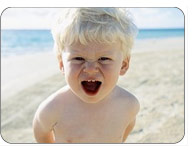Taming the Beast
It seems like only yesterday that your child was a sweet little bundle of joy that laughed and smiled at everything you did. Then they turned one and everything changed. Suddenly there are temper tantrums and aggression, the likes of which you never thought possible for someone so small.

Hitting and biting is very common toddler behavior, especially between the ages of one and two. Because one-year-olds lack the communication skills necessary to express themselves and still operate on impulse reflexes, physical aggression is a normal way for children to express themselves. But it does get better! As your child's vocabulary expands and they begin to understand empathy as well as the consequences of their actions, their tendency to hit and bite others will fade away.
Anger in the Peaceful Home
Parents are often surprised that their young child is not only capable of such violent reactions, but that they know to do it. While a toddler's impulsive nature and lack of control over their emotions certainly plays a large part in their aggression, how they express that anger may be learned.
Playful roughhousing with toddlers and biting on their toes and fingers may seem harmless, but it is often where the behavior is learned. Additionally, children at this age are in an oral stage, which means they want to discover the world through their mouth. As a result, biting a parent or playmate is a toddler's way of exploring the person near them. A toddler biting you is not necessarily intended to hurt you.
Why it Happens
Reasons for a toddlers aggression can vary, from fatigue to hunger to frustration to simple curiosity. A toddler who hits a playmate is more likely to be looking for a way to assert their independence and will, than to purposely hurt their friend. And while biting may not be the type of oral communication skills you were hoping your child would develop, understand that it is their inability to say "I'm frustrated!" that is causing them to lash out.
Although toddler aggression can occur at any time, it seems to be especially prevalent when a toddler is placed in a setting outside of the home, like in daycare or a playgroup. A toddler's frustrations can run high when they suddenly find themselves in a situation where they are not the focus of attention and they have to share their toys with others. Adjusting to any type of major transition, like a move or the arrival of a new sibling, can also bring out the violent beast in your child.
What to Do
Dealing with toddler aggression can take a lot of patience from parents because you may need to repeat yourself 100 times before your toddler begins to understand why their actions are inappropriate. But there are some things you can do to help curb their impulses:
- Attend to the person who was hit or bitten first. Make sure your toddler hears you as you apologize to the child. By focusing your attention on the other person first, your toddler receives the message that biting or hitting is not an effective way to get your attention.
- Once you have tended to the other person, look to remove your child from the situation. You don't want to lecture or punish them but do calmly tell them in a firm voice that hurting others is not acceptable behavior. A simple "You hurt Ralph when you hit him. You shouldn't hit people." is sufficient.
- If your child goes to hit you, block their hand and firmly tell them "No, we do not hit people." If they bite you, point to the spot and tell them that it hurts.
- Encourage your child to verbally express their feelings. Teach them to say simple things like "I'm mad" or "I'm tired" to get their point across.
- If your toddler likes to bite a lot, try providing them with a substitute, like a blanket or a teething ring.
- Keep some snacks on hand that they can chomp on. Not only will this help to prevent biting that is a result of hunger, it can also be used as a substitute to biting.
- If their aggression appears after making a large transition, try giving them more attention at home. Let them know that they are still special to you even though they now have a new sister or have to spend a few hours at daycare everyday.
- Never repeat the behavior. Don't even try to "show" how it hurts when your toddler bites or hits others by biting or hitting them back. Toddler's learn by your actions and even if your mouth says "No" your actions say "Okay, go ahead". Avoid the confusion; make your point verbally not physically.
Physical aggression in toddlers is a phase that generally starts to get better when their vocabulary has grown. By two or three years of age, hitting and biting should be all out of your child's system.
Learn more about how to deal with toddler aggression by chatting with other moms of toddlers in our toddler forum.
